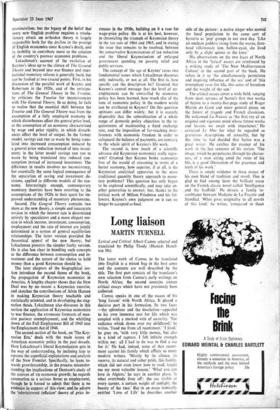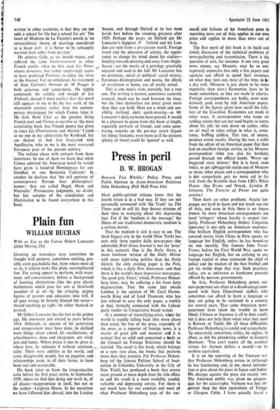Long liaison
MARTIN TURNELL
Lyrical and Critical Albert Camus selected and translated by Philip Thody (Hamish Hamil- ton 30s) The latest work of Camus to be translated into English is a mixed bag in the best sense and the contents are well described by the title. The first part consists: of the translator's own selection from Camus's early writings on North Africa; the second contains sixteen critical essays which have not previously been collected.
Camus speaks in one of the essays of his 'long liaison' with North Africa. It played a decisive part in his formation. Its two faces —the splendour and the desolation—appealed to his own immense zest for life which was coupled with a marked vein of austerity. 'The radiance which shone over my childhood,' he writes, 'freed me from all resentment.' I lived,' he goes on, `with very little money, but also in a kind of rapture. I felt infinite strength within me: all I had to do was to find a use for it.' He had, indeed, none of that resent- ment against his family which afflicts so many modern writers. 'Merely by its silence, its reserve, its natural and sober pride, this family, which did not even know how to read, taught me my most valuable lessons.' What you can love in Algiers,' he says in another place, 'is what everybody lives off: the sea visible at every eorner, a certain weight of sunlight, the beauty of the race.' But in an essay ironically entitled 'Love of Life' he describes another written in other countries, is that they are not only a school for life but a school for art.' The heart of Madame de La Fayette's novels is 'an extraordinary theory of marriage considered as a lesser evil: it is better to be unhappily married than suffer from passion.'
He admires Gide, as we should expect, and suffered the same bouleversement as other French youths when he first read Les Nour- ice ritures terrestres, but rather surprisingly seems to have preferred PrefexteA to either the recirs or the Journal. For an unbeliever, his treatment di of Jean Guitton's Portrait de M Pouget is both generous and sympathetic. He rightly commends the solidity and insight of Les Thibault, though I must confess that this novel still appears to me to be the last work of the nineteenth century rather than the contem- porary masterpiece for which Camus takes it. He hails Rend Char as the greatest living French poet and Fureur et mystere as 'the most astonishing book that French poetry has given us since Les Illuminations and Alcools.' I yield to no one in my admiration for Rimbaud, but am shaken to find him bracketed with Apollinaire, who to me is the most overrated European poet of the present century.
The volume closes with extracts from three interviews. In one of them we learn that while Camus admired the American novel he would have given 'a hundred Hemingways for one Stendhal or one Benjamin Constant.' In another he declares that 'the evil geniuses of contemporary Europe bear philosophers' names: they are called Hegel, Marx and Nietzsche.' Provocative judgments, no doubt, but fair samples of the stimulation and illumination to be found everywhere in this book.































 Previous page
Previous page